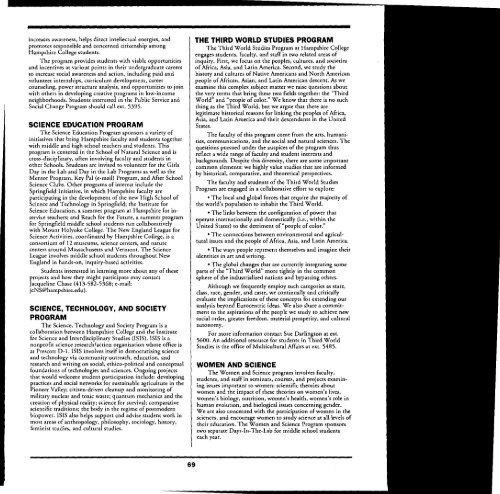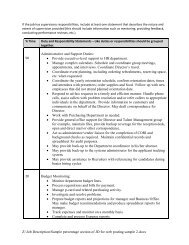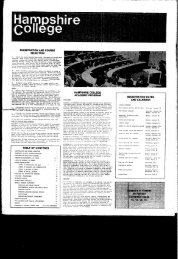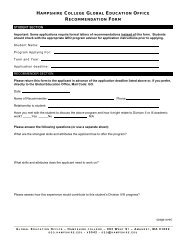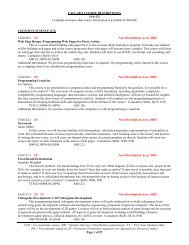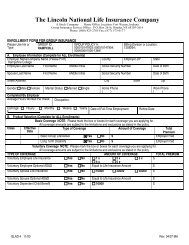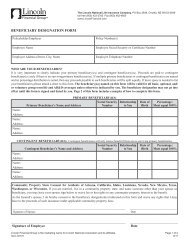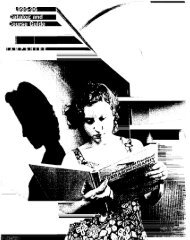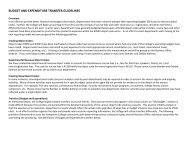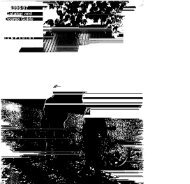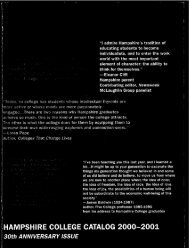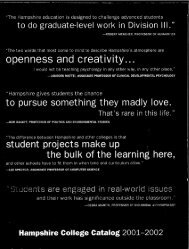school of social science - Hampshire College
school of social science - Hampshire College
school of social science - Hampshire College
You also want an ePaper? Increase the reach of your titles
YUMPU automatically turns print PDFs into web optimized ePapers that Google loves.
increases awareness, helps direct intellectual energies, and<br />
promotes responsible and concerned citizenship among<br />
<strong>Hampshire</strong> <strong>College</strong> students.<br />
The program provides students with viable opportunities<br />
and incentives at various points in their undergraduate careers<br />
to increase <strong>social</strong> awareness and action, including paid and<br />
volunteer internships, curriculum development, career<br />
counseling, power structure analysis, and opportunities to join<br />
with others in developing creative programs in low-income<br />
neighborhoods. Students interested in the Public Service and<br />
Social Change Program should call ext. 5395.<br />
SCIENCE EDUCATION PROGRAM<br />
The Science Education Program sponsors a variety <strong>of</strong><br />
initiatives that bring <strong>Hampshire</strong> faculty and students together<br />
with middle and high <strong>school</strong> teachers and students, This<br />
program is centered in the School <strong>of</strong> Natural Science and is<br />
cross-disciplinary, <strong>of</strong>ten involving faculty and students in<br />
other Schools. Students are invited to volunteer for the Girls<br />
Day in the Lab and Day in the Lab Programs as well as the<br />
Mentor Program, Key Pal (e-mail) Program, and After School<br />
Science Clubs, Other programs <strong>of</strong> interest include the<br />
Springfield Initiative, in which <strong>Hampshire</strong> faculty are<br />
participating in the development <strong>of</strong> the new High School <strong>of</strong><br />
Science and Technology in Springfield; the Institute for<br />
Science Education, a summer program at <strong>Hampshire</strong> for inservice<br />
teachers; and Reach for the Future. a summer program<br />
for Springfield middle <strong>school</strong> students run collaboratively<br />
with Mount Holyoke <strong>College</strong>, The New England League for<br />
Science Activities, coordinated by <strong>Hampshire</strong> <strong>College</strong>, is a<br />
consortium <strong>of</strong> 12 museums, <strong>science</strong> centers, and nature<br />
centers around Massachusetts and Vermont. The Science<br />
League involves middle <strong>school</strong> students throughout New<br />
England in hands-on, inquiry-based activities.<br />
Students interested in learning more about any <strong>of</strong> these<br />
projects and how they might participate may contact<br />
Jacqueline Chase (413-582-5368; e-mail:<br />
jcNS@hampshire.edu).<br />
SCIENCE, TECHNOLOGY, AND SOCIETY<br />
PROGRAM<br />
The Science, Technology and Society Program is a<br />
collaboration between <strong>Hampshire</strong> <strong>College</strong> and the Institute<br />
for Science and Interdisciplinary Studies (ISIS). ISIS is a<br />
nonpr<strong>of</strong>it <strong>science</strong> research/action organization whose <strong>of</strong>face is<br />
at Prescott D-1. ISIS involves itself in democratizing <strong>science</strong><br />
and technology via community outreach. education, and<br />
research and writing on <strong>social</strong>, ethico-political and conceptual<br />
foundations <strong>of</strong> technologies and <strong>science</strong>s. Ongoing projects<br />
that would welcome student participation include: developing<br />
practices and <strong>social</strong> networks for sustainable agriculture in the<br />
Pioneer Valley; citizen-driven cleanup and monitoring <strong>of</strong><br />
military nuclear and toxic waste; quantum mechanics and the<br />
creation <strong>of</strong> physical reality; <strong>science</strong> for survival; comparative<br />
scientific traditions; the body in the regime <strong>of</strong> postmodern<br />
biopower. ISIS also helps support and advise student work in<br />
most areas <strong>of</strong> anthropology. philosophy, sociology, history,<br />
feminist studies, and cultural studies.<br />
69<br />
THE THIRD WORLD STUDIES PROGRAM<br />
The Third World Studies Program at <strong>Hampshire</strong> <strong>College</strong><br />
engages students, faculty, and staff in two related areas <strong>of</strong><br />
inquiry. First. we focus on the peoples, cultures. and societies<br />
<strong>of</strong> Africa, Asia, and Latin America, Second, we study the<br />
history and cultures <strong>of</strong> Native Americans and North American<br />
people <strong>of</strong> African. Asian, and Latin American descent. As we<br />
examine this complex subject maner we raise questions about<br />
the very terms that bring these two fields together: the "Third<br />
World" and "people <strong>of</strong> color." We know that there is no such<br />
thing as the Third World, but we argue that there are<br />
legitimate historical reasons for linking the peoples <strong>of</strong> Africa,<br />
Asia. and Latin America and their descendants in the United<br />
States.<br />
The faculty <strong>of</strong> this program come from the arts, humanities.<br />
communications, and the <strong>social</strong> and natural <strong>science</strong>s. The<br />
questions pursued under the auspices <strong>of</strong> the program thus<br />
reflect a wide range <strong>of</strong> faculty and student interests and<br />
backgrounds. Despite this diversity, there are some important<br />
common elements: we highly value studies that are informed<br />
by historical, comparative, and theoretical perspectives,<br />
The faculty and students <strong>of</strong> the Third World Studies<br />
Program are engaged in a collaborative effort to explore:<br />
• The local and global forces that require the majority <strong>of</strong><br />
the world's population to inhabit the Third World.<br />
• The links between the configuration <strong>of</strong> power that<br />
operate internationally- and domestically (i,e" within the<br />
United States) to the detriment <strong>of</strong> "people <strong>of</strong> color,"<br />
• The connections between environmental and agricultural<br />
issues and the people <strong>of</strong> Africa, Asia, and Latin America.<br />
• The ways people represent themselves and imagine their<br />
identities in art and writing.<br />
• The global changes that are currently integrating some<br />
parts <strong>of</strong> the "Third World" more tightly in the common<br />
sphere <strong>of</strong> the industrialized nations and bypassing others.<br />
Although we frequently employ such categories as state,<br />
class, race, gender. and caste, we continually and critically<br />
evaluate the implications <strong>of</strong> these concepts for extending our<br />
analysis beyond Eurocentric ideas, We also share a commitment<br />
to the aspirations <strong>of</strong> the people we scudy to achieve new<br />
<strong>social</strong> order, greater freedom, material prosperity, and cultural<br />
autonomy,<br />
For more information contact Sue Darlington at ext.<br />
5600. An additional resource for students in Third World<br />
Studies is the <strong>of</strong>face <strong>of</strong> Multicultural Affairs at ext. 5485,<br />
WOMEN AND SCIENCE<br />
The Women and Science program involves faculty,<br />
students, and staff in seminars, courses, and projects examining<br />
issues important to women: scientific theories about<br />
women and the impact <strong>of</strong> these theories on women's lives,<br />
women's biology, nutrition, women's health, women's role in<br />
human evolution, and biological issues concerning gender.<br />
We are also concerned with the participation <strong>of</strong> women in the<br />
<strong>science</strong>s, and encourage women to study <strong>science</strong> at all levels <strong>of</strong><br />
their education. The Women and Science Program sponsors<br />
cWo separate Days-In-The-Lab for middle <strong>school</strong> students<br />
each year.


